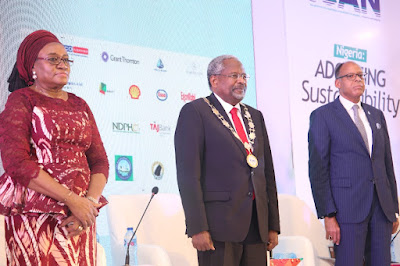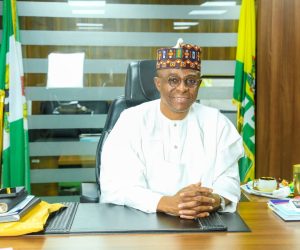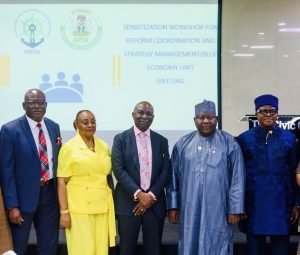Nigeria’s SDG Financing is $1 Billion – Finance Minister

By Bisi Akingbade
The Minister of Finance, Mrs Zainab Shamsuna Ahmed has said that the cost of Nigeria’s Sustainable Development Goals (SDG) financing requirements is about USS 1 00 billion.
While speaking at the ICAN Conference themed “Nigeria Adopting Sustainability for Economic Prosperity, said
Nigeria has remained resolute in its desire to achieve economic growth and has made determined efforts to mitigate the effects of the global pandemic and other global headwinds that continue to constrain global growth.
The nation is not only confronted by the necessity of inclusive growth but also bound to measure growth, not in absolute terms but in terms of its environmental price, the social consequence, and the potential implication for posterity and long-term stability.
Ahmed said the Federal Government is committed to the 2030 Agenda for sustainable development and the SDGs. “This commitment culminated in the recent launch of the Integrated National Financing Framework (INFF). “The goal of INFF is to enhance revenue collection at the national and sub-national levels. To digitalize, optimize and make the tax system much more effective, better coordinate the budget processes, and make public spending much more effective.
She said some of the Other Government Reforms and initiatives being undertaken to put Nigeria on a steady path of sustained growth include: Strengthening and continued implementation of the Strategic Revenue Growth Initiatives to shore up Government revenues, reduce financing pressures, and expand the fiscal space.
“Rationalizing expenditure by focusing on priority spending on growth-enhancing sectors of the economy.
“Enhancing growth in non-oil Export through fiscal and trade incentives
“Improving and sustaining political and macroeconomic stability, as well as addressing security and infrastructural challenges, to attract Foreign Direct Investments (FDJs).
“Improve the monitoring and tracking revenue from government-owned enterprises (GOEs) and develop a model for continuous improvement in activities. The aim is to make these enterprises financially and commercially viable so that they will have no recourse to government for funding and continuing the Enabling Business Reforms.
Ahmed noted that a vital component of the sustainability agenda is financial sustainability. She said Nigeria is counting on your professional support to ensure economic sustainability becomes a national culture.
The National Development Plan has advanced clear strategies to intensify the transition and drive toward financial sustainability.
We must deepen the revenue base of the economy through broader and strategic diversification. The recent Environmental Social Governance (ESG) regulations by the Securities and Exchange Commission to catalyze, Corporate and sub-national bond issuance are also of note. “Although, the total issuance size of both Federal, State and Corporates are relatively small, given the global appetite and increasing awareness around sustainability, we believe there will be more traction”.
She said: “Combating wastage and mismanagement is a crucial component of financial sustainability, and the accounting profession does have a sacred responsibility in this regard. “Sustainability reporting is becoming a growing repoyrting area in today’s business world. The growing momentum toward increased organizational disclosure of environmental, social, and governance information has made more companies see the need to report on their ESG operations. Governments and regulators also have increased interest in sustainability reporting, given the demand for disclosure of ESG information from investors and the public.
The Minister said the Institute’s public interest mandate should embolden chartered accountants to lead the innovations around sustainability and sustainability reporting. “Accountants noted for their strong ethical foundations, robust qualifications framework, and extensive skills and experience in generating and assuring decision-useful information are best placed to deliver on this emerging need”, she added.





